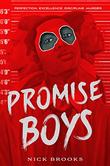“You can tell any story in any medium, right? It’s all storytelling,” Nick Brooks tells Kirkus on a recent Zoom call from Los Angeles. Brooks—a filmmaker, musician, and writer—is living proof of his assertion. The multimedia artist’s latest project is the young adult novel Promise Boys (Henry Holt, Jan. 31),in which a charter school principal’s perplexing death sets three young boys on a mission to prove their innocence. In a starred review, our critic calls the book “breathtakingly complex and intriguing.”
Brooks, a former public school educator, built the world of Promise Boys from the material of his life and memories, he says. “I was just thinking about all the different people that I came across in my time as an educator. Like, OK, OK, what would the lunch lady say here? What would the basketball coach say?” Brooks, like the boys in his story, grew up in Washington, D.C. His protagonists, three young men of color, traverse a troubled world with many threats. But they are also boys who love, who dream, and who run into the arms of their grandfathers, brothers, and mothers; boys we get to view up close. “They’re just kids with big hearts,” says Brooks. “They’re amalgamations of people I know. Hopefully they feel very realized, because they’re all coming from very real places.”
Brooks left education to pursue his myriad passions in the arts, going on to make music with acclaimed singer Tony Williams, to study filmmaking at the University of Southern California, and eventually to publish the middle-grade fantasy novel Nothing Interesting Ever Happens to Ethan Fairmont, which came out last October. “Working within the school system, it was so hard to create change,” he says. “In the arts, [I thought], I can get a platform and a voice. I can get people to finally listen to me.”
Promise Boys packs multiple unrelenting critiques underneath its thrills and mystery: critiques of the profit-driven, militaristic charter school culture that routinely criminalizes Black and brown students; of the larger paradigms underpinning our shared notions of guilt and innocence. Brooks shares that one of his hopes, with this book, is to set much-needed discussions about schools in motion: “How do we support educators? How do we support schools, particularly those that serve Black and brown kids and underserved communities?”
 It will come as no surprise that Brooks’ influences are various. He was a childhood fan of the Hardy Boys. He cites Black Panther co-writer and director Ryan Coogler as a major inspiration. Rapper DMX can be counted as another seminal artist in the development of Brooks’ craft: “I’m a guy who grew up on DMX. He’s the godfather of emo rap, he was such an emotional guy, and his words were so poetic. I love writing those lines, those conversations, those moments that make you feel. I got a lot of that from DMX.”
It will come as no surprise that Brooks’ influences are various. He was a childhood fan of the Hardy Boys. He cites Black Panther co-writer and director Ryan Coogler as a major inspiration. Rapper DMX can be counted as another seminal artist in the development of Brooks’ craft: “I’m a guy who grew up on DMX. He’s the godfather of emo rap, he was such an emotional guy, and his words were so poetic. I love writing those lines, those conversations, those moments that make you feel. I got a lot of that from DMX.”
An astute reader will notice all of Brooks’ disciplines and influences at play in Promise Boys.The action-driven book reads, in moments, like a screenplay. Brooks weaves firsthand accounts from various voices and characters in the story, enabling him to make what he thinks of as music in “the flow of language.” Of course, the story is ultimately a novel, a form Brooks loves for its ability to make a reader feel lost in another world.
Young readers will move through Promise Boys guided by many of the familiar mystery novel tropes: an unexplained murder, a group of endearing protagonists who befriend each other in order to discover the truth, a moment or two of comic relief, and more than one cleverly fashioned bait-and-switch along the way. Brooks, a lifelong mystery lover, offers readers all of the genre’s expected joys: “It’s like a puzzle. I like solving puzzles—it’s always fun for me to try to put the pieces together and figure out if I can get ahead of the artist who was behind the story.” But the genius of Promise Boys is its subversion of the mystery novel’s conventions; in the face of mystery, we are made to ask ourselves: Who do we most readily imagine as capable of the atrocious, or the heroic?
Asked what he is working on now, Brooks responds passionately with a litany of future projects: another YA mystery, a middle-grade graphic novel, a picture-book series, more TV and film work. A rapidly growing group of fans will be waiting expectantly for the next of Brooks’ visions and stories to take shape.
Ricardo Frasso Jaramillo has written for the New York Times, the Believer, McSweeeney’s Quarterly Concern, and other publications.



































